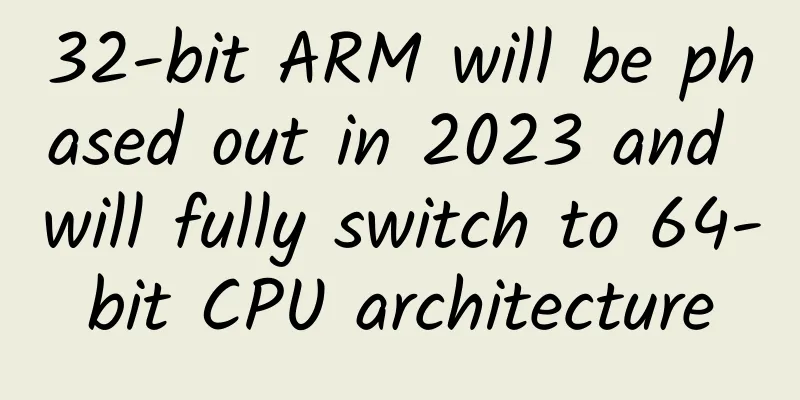32-bit ARM will be phased out in 2023 and will fully switch to 64-bit CPU architecture

|
Not long ago, ARM released the ARMv9 instruction set and launched the Cortex-X2/A710/A510 architecture based on it. This is a major update after the launch of ARMv8 10 years ago, and it is a full move towards a 64-bit instruction set. ARM recently made clear its determination to upgrade this generation of instruction sets to 64 bits. The official statement pointed out that in 2023, all of ARM's large and small core architectures will adopt 64 bits, and 32-bit instructions will be eliminated by then. As for the previous concerns that abandoning 32-bit would lead to compatibility issues, ARM believes that 64-bit is already a mature technology and there is no problem entering the pure 64-bit era. In the previous ARMv8 instruction set, ARM actually made 32-bit and 64-bit instruction sets at the same time. The purpose was to support 64-bit while retaining 32-bit for transition. Now it has been almost 10 years, and there is really nothing to worry about 64-bit. Among mobile phone processors, the iPhone 5s released by Apple in 2013 was the first to support 64-bit. The A7 processor was the first to launch the ARM 64-bit architecture. Later, Qualcomm also supported 64-bit on the Snapdragon 810. After Android 5.0, Google also natively supported 64-bit ARM processors. As for the application side, which is the most worrying, Apple required APP developers to support 64-bit in 2015, and Google's App Store was also upgraded to 64-bit support in 2019, so this is not a problem. There is also the relatively unique domestic market. In April this year, Xiaomi App Store, OPPO Software Store, vivo App Store, Tencent App Store, and Baidu Mobile Assistant announced that all applications released on each app store in the future must support the 64-bit Arm architecture in an orderly manner. Before the end of this year, all applications and games must upload APKs containing 64-bit builds as planned (covering updates to existing applications and releases of new versions). According to the schedule, all mobile Android applications in the Chinese market are expected to fully adopt 64-bit by the end of August 2022. Now it seems that ARM's slogan of eliminating 32-bit CPUs by 2023 is obviously still achievable.
|
<<: Android 12 details improvements: new chip in the status bar can display call duration
>>: Will iPad and Mac merge in the future?
Recommend
The principles and applications of iOS compilation process
Preface Programming languages can generally be ...
Chris Ke Lisi "Advanced Technology Pro" Baidu network disk download
Chris Ke Lisi's advanced technology Pro tutor...
2015 Android Development New Technology
Development Tools Android Studio: Google official...
Tips for making creative advertising promotions near WeChat, use them well to triple your sales! Case Analysis
"The Big Dipper points to the southeast, and...
Sometimes, it's a good thing when animals fight?
Produced by: Science Popularization China Author:...
Curiosity made a major discovery: the lakes on Mars were once frozen due to the cold, and there is also a carbon cycle!
[Mobile software: Bo Ke Yuan] By studying the che...
Mobei Kefan Information Flow Advertising Marketing Introduction and Practical Video Tutorial (Baidu Netdisk)
The video tutorials of Mobei Class from introduct...
Why does iPhone have the best quality among all mobile phones?
Many people describe the Earth in this way: our E...
Follow the following principles and stop worrying about Xcode code signing issues
[[139309]] Thanks to the following habits, I have...
The secret behind Facebook ad’s high click-through rate materials!
Whether it is cross-border e-commerce or overseas...
Testin releases free internal testing tool Pre.im to create a Chinese version of TestFlight
TestFlight, a mobile app beta testing tool favore...
How did Internet movies make a comeback?
For the 2014 summer movies, the film producers ar...
A great guide to job hopping for programmers
[[134505]] May 2015 is already halfway through, a...
The latest news on the lifting of the lockdown in Shanghai Pudong in 2022: When will it be lifted? The most closed area policy!
Recently, the epidemic situation in Shanghai is re...
Uncle Wolf's Little Red Book Hot Product Promotion and Traffic Training Course No. 11
The 11th course catalogue of Wolf Uncle's Xia...









